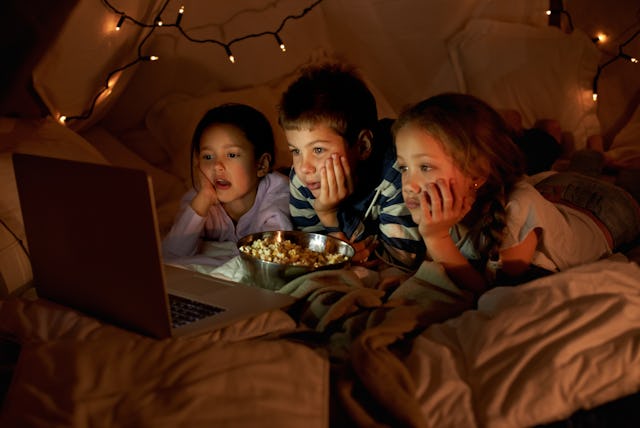What Is The Right Age For A Sleepover?
Experts weigh in with advice, insight, and their own personal approaches to this rite of passage.

Until recently, sleepovers were not a thing in our house. Though we'd received a handful of sleepover invites over the years, my son seemed indifferent to them. He loved long, lingering playdates that stretched toward bedtime but has always been more of a co-dependent sleeper who needs his routine to settle his brain down at night. While some of his friends were having sleepovers at 8, 9, 10, and 11, my son was definitely not ready.
And then it happened. At age 12, we hit what I am now calling "peak sleepover mode." Sleepovers, and sometimes even double sleepovers, reign supreme. Our home and that of his best friends are a revolving lineup of creative bed configurations, snack depletion, and late nights.
What is the right age for a sleepover? Clearly, the answer is subjective.
It’s not just about your child’s readiness.
Dr. Sid Khurana, a board-certified adult, child, and adolescent psychiatrist and the medical director of outpatient services at Nevada Mental Health, is also the father to two children, ages 5 and 8. Neither child has had a sleepover. Khurana acknowledges the significance of sleepovers in child development. "Sleepovers are a rite of passage [and] happen cross-culturally, but the age can be different, which can be dependent on not only the racial and cultural values but also more subtle micro-cultural as well as inter-family variations," he reminds us.
Though we place quite a bit of emphasis on whether our kids are ready, it's essential that parents check their own readiness. Khurana suggests that, as parents, we should ask ourselves a few key questions.
- Do you feel you can trust your children?
- Are you confident your children can be safe, and know how to use a phone/text to contact them if they need parental guidance or help? Do your kids know how to react in an emergency, i.e., dialing 9-1-1 for help?
- Have you talked with your child about appropriate vs. inappropriate touching?
Children should also have bathroom independence and be capable of basic hygiene on their own (i.e., brushing their teeth).
Make it an ongoing convo.
"When children start to talk about it or come home from school with these 'plans,' that is an indication that at least your child has taken a next step in their readiness," he explains. However, that doesn't mean they're good to go. Having an honest conversation with your child about what a sleepover is — and if they are comfortable with sleeping away from home — can help determine their readiness level.
Khurana encourages parents to make unique decisions for what feels right to their family. When his 8-year-old daughter was invited to a slumber party, rather than decline the invitation because their family was not ready for the sleepover aspect, they opted instead to have her attend from 5 p.m. to 9 p.m., a solution that allowed for social participation without the pressure on their daughter (or parents).
Therapist, founder of Life Your F'N Life Coaching, and dad Daniel Rinaldi echoes this sentiment. "Based on my own experience as a dad and therapist, I would say the youngest I would recommend a child have a sleepover with friends and family is 8 years old. However, there is no magic age for this — some kids are more comfortable sleeping away from home at a younger age, and some kids just aren't ever comfortable at sleepovers — which is totally OK!"
Run through the “what-ifs.”
Kids will need a plan for a variety of scenarios that could arise. For example, what if the child is unable to sleep? Rinaldi suggests parents develop or practice a "sleepover routine." This will help your child feel more confident. He also recommends "talking through the 'what ifs' (what if they don't feel well, or they can't sleep, or they get homesick)."
If you haven't yet cracked the sleepover code in your household, you're not alone. Though they are a common practice, that doesn't make them easy to implement. Mendi Baron, a licensed clinical social worker (LCSW) and the CEO of Moriah Behavioral Health, sympathizes with the intricacies of navigating sleepover requests.
"Sleepovers pose the simple controversy of letting your child have some level of autonomy and social experience, while simultaneously ensuring that they maintain safety and have the ability to communicate and seek help… all without you present." He reminds parents that a successful sleepover is not just about that one night.
Put in the prep work.
In truth, sleepover discussions often start well before the child is ready to embark on their first overnight adventure. Preparing for the inevitable sleepover starts with important conversations about body autonomy, asking for help, and feeling safe away from a familiar environment.
Many parents host sleepovers to ease their children into the idea. If you do find yourself hosting a sleepover, Jessica Berk, a professional sleep consultant and the founder of Awesome Little Sleepers, offers some ideas to help kids actually sleep. She recommends showing children their sleeping places and the cozy blanket and pillow they'll have; making sure any special loveys or blankets the child brought are laid out on the bed to make the kids comfortable; and finding out about the other child's pre-bedtime routine.
She also suggests parents remove electronics from the sleeping room and set bedtime with regular reminders leading up. "The kids will probably want some 'chit-chat' time once they're in bed," she tells us, "so plan ahead for that and set a time limit when you'll come back and let them know it's time to stop talking and go to sleep."
Good night, and good luck.
This article was originally published on